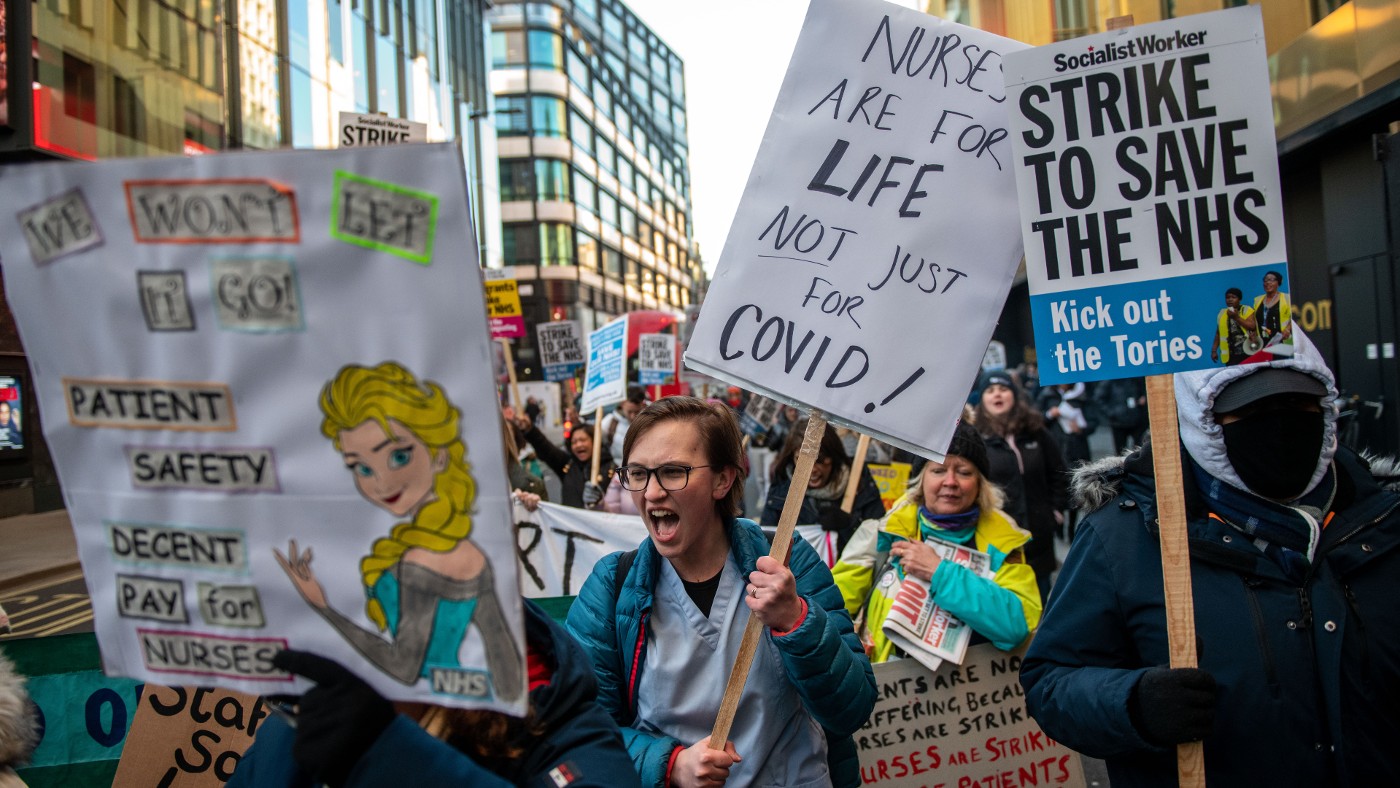Is the NHS pay deal a win for striking nurses?
Unions hailed ‘historic victory’ but reports question whether 5% rise will be paid for by more cost-cutting

A free daily email with the biggest news stories of the day – and the best features from TheWeek.com
You are now subscribed
Your newsletter sign-up was successful
Unions are backing a pay rise offered by the government to nurses and ambulance workers following a winter of strikes.
A 5% increase from April has been offered to NHS staff in England along with a one-off payment of at least £1,655 to top up the past year’s pay award.
Health unions “hailed a historic victory”, said The Guardian, and the Royal College of Nursing (RCN) said striking nurses “had been vindicated”. However, union members could yet reject it in ballots.
The Week
Escape your echo chamber. Get the facts behind the news, plus analysis from multiple perspectives.

Sign up for The Week's Free Newsletters
From our morning news briefing to a weekly Good News Newsletter, get the best of The Week delivered directly to your inbox.
From our morning news briefing to a weekly Good News Newsletter, get the best of The Week delivered directly to your inbox.
What the newspapers said
Several papers have warmly welcomed the breakthrough. Metro urged union members to back the deal, saying it offers “hope a winter of damaging strikes could soon be over”, and the Daily Express called the agreement a “victory for common sense and patients” and said it “must now be backed by union members”.
Speaking to The Mirror, Pat Cullen, general secretary of the RCN, described it as “real, tangible progress” and the inews site said the deal “saw the government tear up its red line on not opening talks on this year’s pay” and “can be considered a significant victory for the unions”.
However, Isabel Hardman, assistant editor of The Spectator, has been told the money for the agreement “isn’t new cash”. This could “cause a real ruckus” with unions, she added, because they “came away from talks believing that the £2.5 billion deal was extra money from the Treasury”.
Instead, the money is going to come from “efficiencies”, or cost-cutting, elsewhere in the health service, government sources have told Hardman. “This is going to be very difficult for NHS chiefs to stomach,” she wrote, and could lead to a negative reaction from Unison leaders who said they were told it was “new money”.
A free daily email with the biggest news stories of the day – and the best features from TheWeek.com
A Treasury source told The Guardian that existing budgets allowed for a 3.5% increase, but the Department of Health and Social Care would have to pay for the rest through efficiency savings or bid for more funding in the coming months.
Wherever the funds are coming from, some feel the agreement is far from a victory. Writing on Twitter, economic justice campaigner Richard Murphy said that with inflation at 10%, the 5% offer “leaves nurses 5% worse off for good”. He added that “they’d be mad to accept this offer” and “it’s insulting to offer it”.
What next
All but one of the main health unions will recommend the deal as a “fair and reasonable settlement”, with Unison the sole outlier, saying it will leave it to its members to decide, when ballots are held next month.
There are hopes that the pay deal heralds the end to a wave of public sector strikes. Asked on LBC whether the deal could be the beginning of a wider settlement of public sector pay, Chancellor Jeremy Hunt said: “I hope so.”
Doctors’ leaders and ministers are being urged to start formal pay talks after the breakthrough with nurses. Junior doctors in England staged a three-day walkout earlier this week but the Evening Standard said they could meet the health secretary for talks “as soon as this afternoon”.
Teaching unions have also agreed to “intensive talks” with the government in exchange for a “period of calm”, reported The Telegraph.
The National Education Union, which held two days of strike action this week, will start negotiations with Education Secretary Gillian Keegan today and they plan to continue over the weekend.
Mike Clancy of Prospect, which represents striking civil servants, believes the NHS deal could provide a “template for unlocking disputes elsewhere”, said Politico, but Passport Office workers have announced five weeks of strikes, saying “ministers have failed to hold any meaningful talks with us”, reported the BBC.
Overall, some feel there have been no winners in the recent wave of industrial action. “Politically, the strikes have been a score draw,” wrote Chris Smyth, Whitehall editor of The Times, because “unions showed ministers they cannot be taken for granted and ministers made the point to unions that they are no pushovers and to voters that they can be trusted with taxpayers’ money”.
Chas Newkey-Burden has been part of The Week Digital team for more than a decade and a journalist for 25 years, starting out on the irreverent football weekly 90 Minutes, before moving to lifestyle magazines Loaded and Attitude. He was a columnist for The Big Issue and landed a world exclusive with David Beckham that became the weekly magazine’s bestselling issue. He now writes regularly for The Guardian, The Telegraph, The Independent, Metro, FourFourTwo and the i new site. He is also the author of a number of non-fiction books.
-
 The 8 best TV shows of the 1960s
The 8 best TV shows of the 1960sThe standout shows of this decade take viewers from outer space to the Wild West
-
 Microdramas are booming
Microdramas are boomingUnder the radar Scroll to watch a whole movie
-
 The Olympic timekeepers keeping the Games on track
The Olympic timekeepers keeping the Games on trackUnder the Radar Swiss watchmaking giant Omega has been at the finish line of every Olympic Games for nearly 100 years
-
 How are Democrats turning DOJ lemons into partisan lemonade?
How are Democrats turning DOJ lemons into partisan lemonade?TODAY’S BIG QUESTION As the Trump administration continues to try — and fail — at indicting its political enemies, Democratic lawmakers have begun seizing the moment for themselves
-
 How did ‘wine moms’ become the face of anti-ICE protests?
How did ‘wine moms’ become the face of anti-ICE protests?Today’s Big Question Women lead the resistance to Trump’s deportations
-
 How are Democrats trying to reform ICE?
How are Democrats trying to reform ICE?Today’s Big Question Democratic leadership has put forth several demands for the agency
-
 Why is Tulsi Gabbard trying to relitigate the 2020 election now?
Why is Tulsi Gabbard trying to relitigate the 2020 election now?Today's Big Question Trump has never conceded his loss that year
-
 Will Democrats impeach Kristi Noem?
Will Democrats impeach Kristi Noem?Today’s Big Question Centrists, lefty activists also debate abolishing ICE
-
 Do oil companies really want to invest in Venezuela?
Do oil companies really want to invest in Venezuela?Today’s Big Question Trump claims control over crude reserves, but challenges loom
-
 What is China doing in Latin America?
What is China doing in Latin America?Today’s Big Question Beijing offers itself as an alternative to US dominance
-
 Why is Trump killing off clean energy?
Why is Trump killing off clean energy?Today's Big Question The president halts offshore wind farm construction